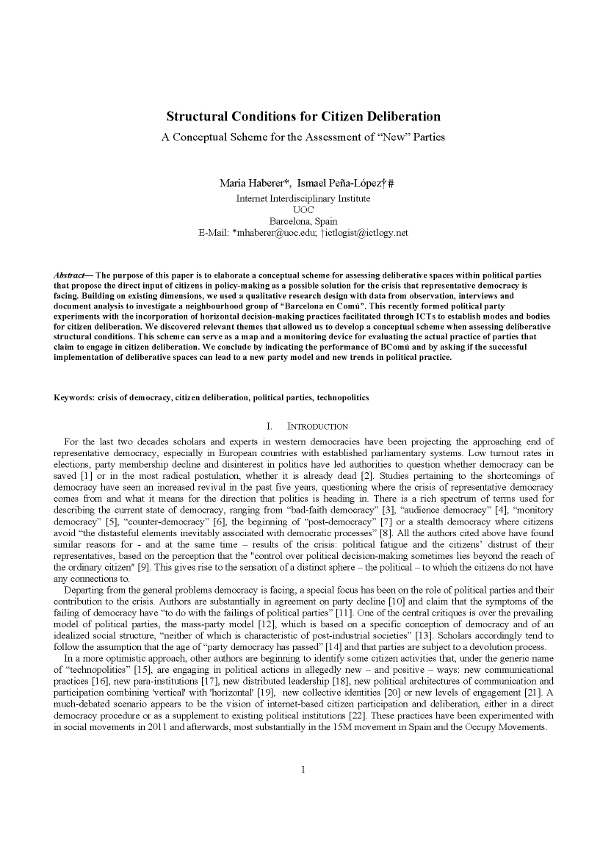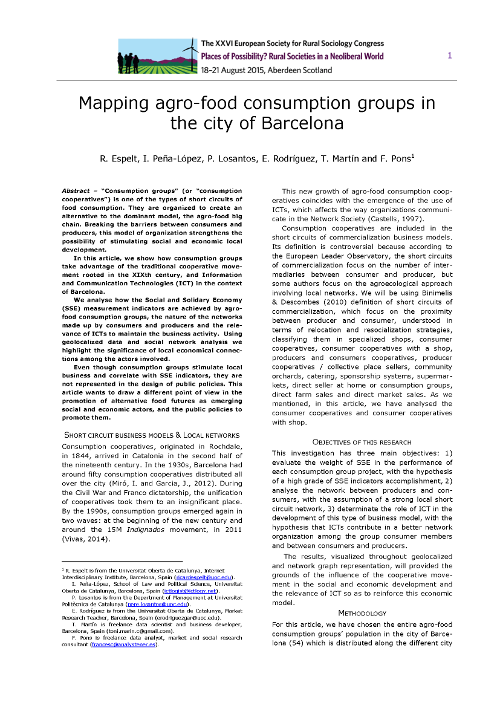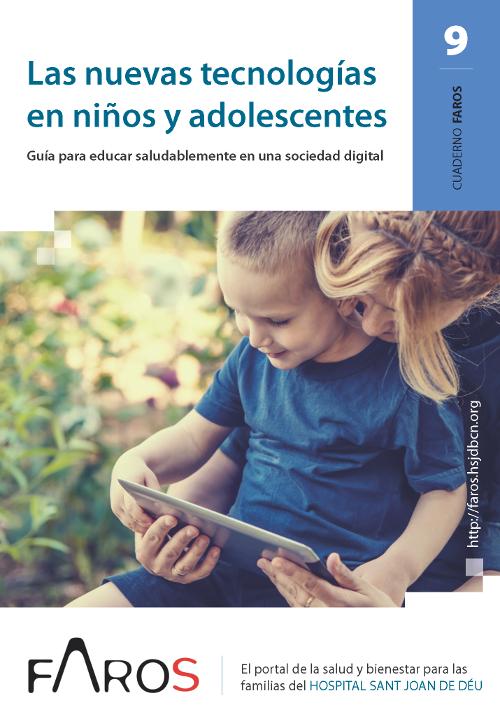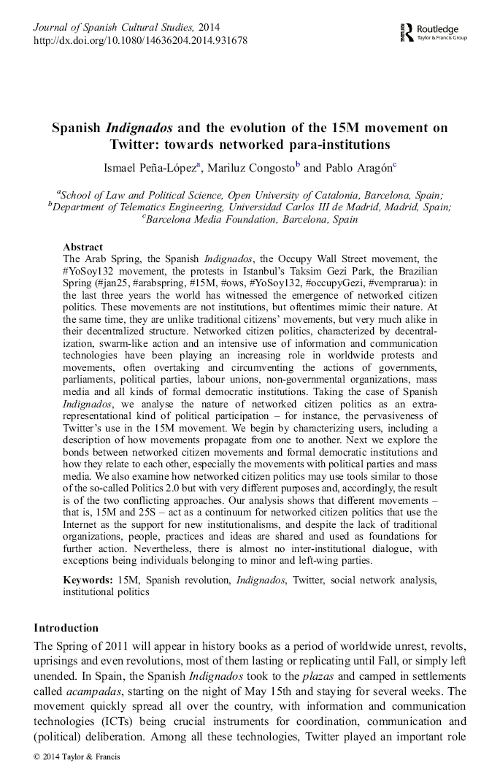20160521
By Ismael Peña-López
Main categories: e-Government, e-Administration, Politics, News, Participation, Engagement, Use, Activism, Writings
Other tags: barcelona_en_comu | cedem2016 | maria_haberer | proceedings | technopolitics
No Comments »
Maria Haberer and I have presented a communication, Structural Conditions for Citizen Deliberation: A Conceptual Scheme for the Assessment of “New” Parties, at CeDEM2016 – International Conference for E-Democracy and Open Government 2016, organized by the Danube University Krems and that took place in May 18-20 2016 in Krems, Austria.
The research is a first approach to the phenomenon of the “network party” (or net-party) — though we are cautious about the naming and prefer so far a more neutral “new party” — and analyzes the case of Barcelona en Comú, the party now in office in the municipality of Barcelona and whose origin is deeply rooted in the 15M Spanish Indignados movement and other recent social movements with a strong technopolitical profile. The approach takes deliberation as the core around which all the organization spins while transitioning from a social movement to a (traditional?) political party.
Below can be found and downloaded the slides and full text of the communication.
Abstract
The purpose of this paper is to elaborate a conceptual scheme for assessing deliberative spaces within political parties that propose the direct input of citizens in policy-making as a possible solution for the crisis that representative democracy is facing. Building on existing dimensions, we used a qualitative research design with data from observation, interviews and document analysis to investigate a neighbourhood group of “Barcelona en Comú”. This recently formed political party experiments with the incorporation of horizontal decision-making practices facilitated through ICTs to establish modes and bodies for citizen deliberation. We discovered relevant themes that allowed us to develop a conceptual scheme when assessing deliberative structural conditions. This scheme can serve as a map and a monitoring device for evaluating the actual practice of parties that claim to engage in citizen deliberation. We conclude by indicating the performance of Barcelona en Comú and by asking if the successful implementation of deliberative spaces can lead to a new party model and new trends in political practice.
Slides
Dowloads
20160518
By Ismael Peña-López
Main categories: Knowledge Management, News, Writings
Other tags: EAFT | proceedings
No Comments »
The European Association for Terminology has just published the Proceedings of the VII EAFT Terminology Summit 2014: Social Media and Terminology work
in which I opened with a keynote speech: The challenge of being (professionally) connected.
The topic dealt with the fact that being up-to-date with digital technologies (ICTs in general, social media in particular) is not a luxury but a must for people working in knowledge intensive environments or jobs. And, beyond the uptake of digital technologies, there is also the need to build networks around one-self — not necessarily digital ones, but surely enhanced and often enabled by digital technologies.
Please find below the slides and (subsequent) full text of the conference.
Abstract
Throughout the history of humankind, information has been trapped in a physical medium. Cuneiform tablets in Mesopotamia, papyrus of ancient Egypt, modern books, newspapers. Even the most intangible information, the one locked inside the brains of people, usually implied having to coincide in time and space with the device that contained what we wanted to know. That’s why, for centuries, we have structured our information management around silos – archives, libraries, collections, gatherings of experts – and around ways to structure this information – catalogues, taxonomies, ontologies. The information lives in and out of the well, there’s the void. With the digitization of information, humankind achieves two milestones: firstly, to separate the content of the container; secondly, that the costs of the entire cycle of information management collapse and virtually anyone can audit, classify, store, create, and disseminate information. The dynamics of information are subverted. Information does not anymore live in a well: it is a river. And a wide and fast-flowing one. Are we still going to fetch water with a bucket and pulley, or should we be looking for new tools?
Slides
Dowloads
Text of keynote:
Peña-López, I. (2016). “
The challenge of being (professionally) connected”. In European Association for Terminology (Ed.),
Proceedings of the VII EAFT Terminology Summit 2014: Social Media and Terminology work, 11-28. Barcelona 27-28 November 2014. Barcelona: EAFT.
20150819
By Ismael Peña-López
Main categories: Development, ICT4D, News, Writings
Other tags: agrifood | enrique_rodriguez | esrs | francesc_pons | pere_losantos | ricard_espelt | toni_martin
1 Comment »
My colleague Ricard Espelt is these days at the XXVI European Society for Rural Sociology Congress, in Aberdeen, Scotland. The motto of this year’s edition of the congress is Places of possibility? Rural societies in a neoliberal world
and this is just what Ricard is presenting on behalf of a small team he put up to analyse and map agro-food consumption groups in the city of Barcelona.
The communication he just presented, Mapping agro-food consumption groups in the city of Barcelona, is but a part of a major research project that Ricard is doing and that I have the luck to be a part of. Following can be found the abstract, slides and downloads of our communication, signed together by Ricard Espelt, Pere Losantos, Enrique Rodríguez, Toni Martín, Francesc Pons and myself. Mind that it is only a short paper and, thus, only a small part of the information produced is available. Comments (and/or requests) will definitely be welcome.
Abstract
“Consumption groups” (or “consumption cooperatives”) is one of the types of short circuits of food consumption. They are organized to create an alternative to the dominant model, the agro-food big chain. Breaking the barriers between consumers and producers, this model of organization strengthens the possibility of stimulating social and economic local development.
In this article, we show how consumption groups take advantage of the traditional cooperative move-ment rooted in the XIXth century, and Information and Communication Technologies (ICT) in the context of Barcelona.
We analyse how the Social and Solidary Economy (SSE) measurement indicators are achieved by agro-food consumption groups, the nature of the networks made up by consumers and producers and the rele-vance of ICTs to maintain the business activity. Using geolocalized data and social network analysis we highlight the significance of local economical connec-tions among the actors involved.
Even though consumption groups stimulate local business and correlate with SSE indicators, they are not represented in the design of public policies. This article wants to draw a different point of view in the promotion of alternative food futures as emerging social and economic actors, and the public policies to promote them.
Slides
Dowloads
Short paper:
Espelt, R., Peña-López, I., Losantos, P., Rodríguez, E., Martín, T. & Pons, F. (2015). “
Mapping agro-food consumption groups in the city of Barcelona”. In
Places of possibility? Rural societies in a neoliberal world. Proceedings of the XXVI ESRS Congress, Aberdeen, Scotland, 2015. Aberdeen: The James Hutton Institute
Slides:
Espelt, R., Peña-López, I., Losantos, P., Rodríguez, E., Martín, T. & Pons, F. (2015). “
Mapping agro-food consumption groups in the city of Barcelona”. In
Places of possibility? Rural societies in a neoliberal world. Proceedings of the XXVI ESRS Congress, Aberdeen, Scotland, 2015. Aberdeen: The James Hutton Institute
20150531
By Ismael Peña-López
Main categories: Information Society, News, Participation, Engagement, Use, Activism, Writings
Other tags: informe_faros
No Comments »
FAROS is the childhood and youth health observatory of the Sant Joan de Déu Hospital, one of the most renowned hospitals specialized in children and youngsters in Spain.
Every year they publish a book — the FAROS report — which deals about a topic of especial relevance for families and carers, helping them to understand it and to address it.
The 2015 edition of the FAROS report its entitled Las nuevas tecnologías en niños y adolescentes. Guía para educar saludablemente en una sociedad digital [New technologies in children and youngsters. Guide for a healthy education in a digital society]. As it can be inferred from the title, the report deals about minors accessing technology, the use of devices, online and videogaming, social networking sites, privacy and security, socialization, etc.
I was kindly invited to write one of the final chapters about the pros and cons of digital life. Unlike the preceding co-authors, my approach is not about one specific point of view or technology, but more panoramic. It tries to bring to the debate that the use of technology is a matter of socialization. And, as such, it does carry embedded the very same advantages and risks of interacting with others. Without fully digital inclusion, one will not be in risk of e-exclusion, but in risk of sheer social exclusion. On the other hand, an inappropriate digital inclusion will be very much like inappropriate socialization, putting us in risk of being abused, be an abuser (or a criminal), lack education opportunities and so on.
My chapter is called El doble filo de la tecnología: una oportunidad de inclusión y un peligro de exclusión [The double edge of technology: an opportunity for inclusion and a risk of exclusion] and can be downloaded as follows.
Lots of gratitude to Olga Herrero for counting me in and making it possible.
20150325
By Ismael Peña-López
Main categories: Information Society, News, Writings
Other tags: book_review | journal_of_spanish_cultural_studies | manuel_castells
No Comments »
The Journal of Spanish Cultural Studies has just published a book review that I did on Manuel Castells’ Redes de Indignación y Esperanza (Networks of Outrage and Hope in its English edition).
Unlike most reviews — not my words, but someone else’s — my review is not just a description of what is in the book, but an actual review or, better put, a critique. Not necessarily negative one, mind you, but a reading with at least a critical eye.
In my review — which, by the way, is in Spanish — I begin by telling why the book is relevant and comes at a perfect timing.
Then, I go into debating on of the most important (to me) subjects of Manuel Castells’ trilogy on the Information Society and that the author revisits in his by now latest book: the question of space (or of spaces). Unlike what he did in The Information Age, though, his approach to the concept of space is somewhat changed here, and goes more in the line of what other authors have stated, like John Perry Barlow, William Gibson, Neal Stephenson, Javier Echeverría or Marc Augé.
The paper can be downloaded at the following link, and the bibliography that I used can be accessed after the download section.
Download:
Bibliography:
Alcazan, Monterde, A., Axebra, Quodlibetat, Levi, S., SuNotissima, TakeTheSquare & Toret, J. (2012).
Tecnopolítica, Internet y R-Evoluciones. Sobre la Centralidad de Redes Digitales en el #15M. Barcelona: Icaria.
Stephenson, N. (1992).
Snow Crash. New York City: Bantam Books.
20140824
By Ismael Peña-López
Main categories: News, Participation, Engagement, Use, Activism, Writings
Other tags: 15m | indignados | mariluz_congosto | pablo_aragon | para-institutions | twitter
1 Comment »
My colleagues Mariluz Congosto, Pablo Aragón and I just got a paper published. It is the final, improved version of a research that had already been presented thus:
(more…)







